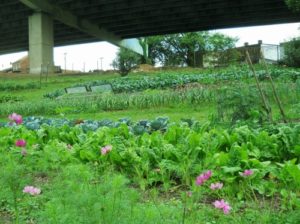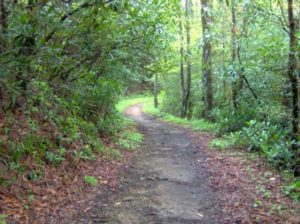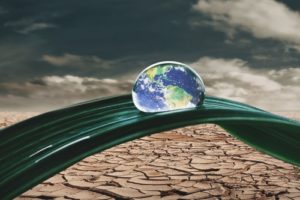More and more people are realizing we live on a finite planet, with finite resources, and the clock is ticking to clean up the mess we have made. Further, we are discovering that a sustainable life does not mean we have to give up our comforts, but instead expand them in new ways. I find a lot of hope in this realization, especially for our younger generations.
Like the wing of the plane, if the environment goes, we all go. We need clean air, clean water, and clean energy to survive. I am not what folks call a “primitivist” at all. I very much enjoy the material benefits of modern human civilization just as much as anyone – but a paradigm shift is needed. Our collective institutions have spent vast amounts of capital, inventiveness, and resourcefulness in the past on industrialization and warfare. Today, all this output needs to be aggressively applied to human survival right here on planet Earth.

A reimaging of human dominated landscapes that invites food production, the forests, prairies, savannahs – all regional biomes – back into our cities, towns, and countryside is a great start. Further, rewilding the planet – promoting biome growth and protecting our oceans – will allow for vast amounts of both material comfort and climate regulation. Acceptance of renewable energy production accompanied by a restructuring of the labor force to design, craft, and install sustainable infrastructure and clean modes of transportation will change the very fabric of the current fossil fuel laden economic reality. Finally, leaving behind the view of “dominion” to adopt an ethos of environmental stewardship and ecological wisdom is crucial. A new worldview has taken root.
Here, along Finley Cane, it’s nice to see a healthy thicket of rivercane, still green in the January winter air. As we pass the wooded grass, we make our turn for the Bote Mountain trail. Almost instantly, the entire atmosphere of our hike changes. Bote Mountain is, in my humble opinion, one of the toughest, most rewarding trails in all of the Smoky Mountains. The ascent is brutal, the descent is painful. The steep slopes are accented by gnarly, thick tree roots. And as a topper, the rock is hard, loose, bustled rubble across the trail. We’ve left the winter woodlands of Finley Cane for a ridge side climb along the eastern flank of Bote Mountain. As we huff and puff up through space, we know that for the next little while our travels will be nothing but an unrelenting uphill slog.
“Oh boy, this is kicking my butt.” Katie admits, a thin veil of sweat glistening across her brow. She turns to me, one hand on her hip while the other fits the nozzle of her water pack to her lips.
“Oh yeah, me too. This is a nice place to breathe for a minute.” I walk off trail a little bit and Katie follows. We’ve a nice view off the flank of Bote Mountain to see the valley and ridge system of the Smoky Mountains roll on across the skyline.
One of my favorite things about our unique little species is human thought and interaction. Our brains are complex, and with said complexity all the good, the bad, and the ugly regarding human civilization has emerged – culture, art, food, tribes, violence, forgiveness, and the rest. At our core, though, even among our systems of power and domination, a very human disposition leans toward curiosity and ingenuity. The more we find out about the world, the more we question the structures around us, and the more we build resistance to domination and control.
I think about this from time to time when I talk with my son, Eli. As a six-year-old, my son is starting to ask deeper questions about the world. When he asks inquisitive questions, he wants honest and reflective explanations. He has a naturally curious mind. He isn’t unique in this capacity at all. Most children are incredibly inquisitive and want to understand the mechanics operating around them. I don’t think this is lost as we get older; we just typically view the world through an indoctrinated lens as adults.
The danger here is that all too many of us slip into tribes and refuse to have our worldview questioned. There are no panaceas for life. Life is too complicated for a one-size-fits-all solution to the complex problems around us. We do need to labor together.

Katie and I take a nice break, but, as morning turns to afternoon, we find ourselves finally leveling out across the top of Bote Mountain. The ridgetop stroll is a welcome break from our ascent. The trail here very nicely meanders under the atmosphere’s blue expanse. Plant life is sparse this January; the Iapetus sandstone crunches beneath our boots. Despite the lack of good sleep, I feel invigorated underneath the winter sun.
“So,” Katie chuckles, “are we at the point in this hike where we start bragging about our kid now?”
I laugh at her question because every time Katie and I are together without Eli, one of us inevitably gets a twinge and we miss him. When this happens, we always talk about how good of a kid he truly is. “Because the past is just a goodbye, teach your children well . . . and know they love you” – so go the lyrics of “Teach Your Children” from Crosby, Stills, Nash, and Young. The years are fleeting, and, though we are trying to teach our son as much as possible, he’s teaching us just as much. Today I’m reflecting on his drive to understand the world – what he wants, what children want, and what I believe most people want.
Time and again I come back to my favorite words from labor activist Rudolf Rocker who notes that
. . . freedom is not an abstract philosophical concept, but the vital concrete possibility of every human being to bring to full development all the powers, capacities, and talents with which nature has endowed them, and turn them to individual and social account.
Is this not what we want for our children, for ourselves – freedom and full human lives? Further, Rocker notes that freedom itself is not
“. . . a fixed, self-enclosed social system but rather a definite trend in the historic development of mankind, which, in contrast with the intellectual guardianship of all the clerical and government institutions, strives for the free unhindered unfolding of all the individual and social forces in life.”
In this sense, freedom, the very idea of human liberty, is not a static social doctrine, instead these ideas are concepts. These concepts constantly become broader, larger in scope, and affect society in various ways.
One may ask, why bother even trying to understand these abstract concepts? Philosophical musings about “definite trends in the historical development of humankind” do nothing to answer the problems we face right here, right now, today – not just as a global species, but as individuals in complex economic realities. We’ve mouths to feed and bills to pay. What’s the point of caring about environmental degradation if I can’t clearly describe a new form of social organization? Are my wishes for a sustainable future simply utopian?

“Invite the forest back into the city and grow food,” I will openly admit, is a bit formless and seems incompatible with our current complex society. However, an argument can be put forward that in the overall arc of human history exists a story of people working together to dismantle systems of domination from previous eras. Far-reaching doctrines of social organization should always be questioned. We are not, nor should we desire to be, masters of anyone. The creative, collaborative, participatory inclination of the human mind is what is needed in this 21st century. The world is changing rapidly.
Sustainable, meaningful change in a society is only justifiable when a large majority of the population believes that currently existing institutions of governance and economics are incompatible with the goals the populace believes to be right and rooted in justice. A creeping mindset is taking over large segments of our population. Team politics and a tribal lens seek to embrace a totalitarian mindset and wield institutional power over “others.” The question needs to be asked – is there a better, more collaborative, more adaptive way to conduct our politics?
Katie and I have finally reached the junction with Lead Cove trail. Here, we begin a steep descent back to our car. As the forest changes around us, the sounds of Sugar Cove Prong splash and burble through a naked woodland. The sky is still a crisp blue but now long, wistful, white clouds can be seen off in the distance. We find ourselves among the evergreen needles of hemlock, leafless limbs of tulip tree, and other knotted branches of a mixed hardwood forest as the Paleozoic sandstone of Bote Mountain gives way to metamorphosed Pre-Cambrian rock.
“Mountains look good on you, Grant,” Katie calls to me from the trail.
“Aww, thanks babe. I’m very happy you rolled me out of bed this morning!”
I’m sure to crash incredibly hard tonight, but, despite the lack of sleep, I have loved every single minute of our hike today. My wife and I have discussed our son, our lives, and the world we find ourselves living in. Despite, well, everything these days, I am happy we have each other on this journey. Good little life we’ve built here.
At the end of the day, our species, Homo sapiens, are simply Earthlings. We are a conscious part of the only known living biosphere in the entirety of the cosmos. As Earthlings, our planetary history can teach us a lot about who we are. Further, our planetary history can teach us a lot about where we are going. As our Appalachian Mountains rose in a series of orogenies, as a supercontinent was built only to drift apart, as an ancient ocean disappeared only to father the modern Atlantic, over a period spanning more than a billion years, life adapted to its environment, moved across the Earth, and began the long road toward the biodiversity of today. But there were moments of tragedy along the way. Five mass extinction events interrupted the progression of Earthly species. A mosaic of changes caused these historic mass extinctions, but one constant has remained across all five: a global change in climate. As we live today, we now experience the sixth mass extinction of our planetary history as global climate changes dramatically yet again. We are on that aforementioned plane. Will the rivet spare our wing?

We are living in the climate century. If global human civilization doesn’t take up the climate challenge and halt the destruction of the living biosphere, all signs signal we will pop our own rivet. Our species is reaching a point that will be hard to turn around. I am not arguing that by end-of-century our species will suddenly enter the halls of extinction. But we will reach a tipping point that will affect the security of the world our children and grandchildren inherit. Further, we may doom organized society for our distant posterity – those we will never meet. In doing so, we will have ended our species. There will be no humanity beyond the firmament if we take away our very own capacity to labor with one another. So, yes, with formless ideology we know what to do: preserve the wild that remains, rewild exploited areas with more wilderness, invite biomes back into our cities, grow mixed agricultural fields in populated areas, advance renewable energy, and help each other along the way. The beginning of this revolution is already here, I just hope we don’t get in our own way. We are engaged in an ongoing struggle, one that is often grim, but never hopeless, and one that boasts a lot of progress for human freedom, the promise of a radical liberty, and a more sustainable social order.
Past Anthony Creek, Katie and I turn onto Crib Gap to finish our day. Our hemlock laden forest changes, as pines and oaks begin to dominate the landscape. We eventually move out of the quiet and still woodland, to walk along the side of Laurel Creek Road back to our parking spot. Even for January, a steady whoosh of cars disrupts the calm of the mountain terrain – a stark contrast from our last several hours. All is well – may more of us find leisure in spaces dedicated to the unimpaired preservation of our collective natural and cultural resources so we may be inspired to protect these places for the enjoyment, education, and inspiration of all future generations.
**Featured image by Michell Trommler on Pixabay

You write natural history very well. What an interesting genre! It allows close real-time observation, informative exposition about past processes, and philosophical speculation. You bring all of this together seamlessly.